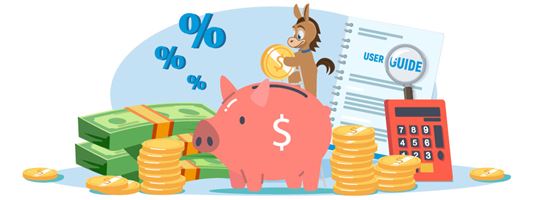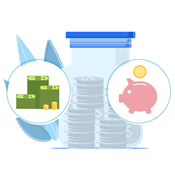What is a Savings Account?
Everyone needs a savings account. In this guide, get answers on tax considerations, account safety, and how to use your savings account effectively.
 |
Savings accounts provide a safe place to set aside money for the future. They're easily accessible, flexible, and can earn interest.
In this quick guide, learn the basics of savings accounts, why you should open one, and other accounts to consider.
Checking accounts are used for day-to-day expenses like bills, groceries, and gas. They are linked to your debit card and do not typically bear interest. Savings accounts are intended to keep money for longer periods of time. They earn interest and limit both withdrawals and transfers. Get an in-depth comparison here.
What is a Savings Account?
Savings accounts are a basic product offered by all banks and credit unions. They're intended to help customers save money for short-term goals (such as a down payment on a car) and emergency expenses (like helping to cover unplanned medical bills).
Savings accounts usually earn interest (called annual percentage yield, or APY), which is credited to your account at the end of each month.
Savings account interest rates are variable and can change at a moment's notice. A good rule of thumb is that the higher and more competitive the interest rate being offered, the more likely it is to change — these are often promotional rates used by banks to lure new customers.
Any interest earned over $10 in a calendar year is considered taxable income and will be taxed based on your tax bracket. Your bank or credit union will send you a 1099-INT form at tax season if you have earned more than $10 in interest.
Pros & Cons of a Savings Account
PROS:
- Can earn a little bit of interest (varies by bank)
- Risk free; your money will not decrease
- Funds are readily accessible whenever you need them
- Easy to open
- Your money is protected by the FDIC (NCUA for credit unions) up to $250,000
CONS:
- Interest is very minimal
- Interest rate can change at any time
- Limited to 6 withdrawals per month
- Some banks may have a monthly fee or minimum balance requirement
How Does a Savings Account Work?
Savings accounts offer a fairly flexible and liquid place to stash money you may need in the short term.
If you have a savings account and checking account at the same financial institution, the money in your savings account can be accessed instantaneously by transferring money from your savings into your checking.
The Federal Reserve used to limit transfers from savings accounts to a maximum of six transfers per month.
The big psychological benefit of savings accounts is that they help you to set aside money by separating your spending cash from the money you want to earmark for future expenses.
While there are some high-yield checking accounts out there, it is still wise to have a separate account specifically for saving.
Savings refers to funds set aside for the future. Savings can be used for large expenses like buying a home, for retirement, or just to have a cushion of cash available for unplanned expenses so that you do not need to take out loans or use high-interest credit cards.
The 3 Types of Savings Accounts
There are a variety of different types of savings accounts that come with their own unique set of features. We'll review them here.
Traditional Savings Account
If you open a basic savings account with your bank or credit union, you are most likely opening up a traditional savings account.
Traditional savings accounts pay a variable interest rate which can change over time, but offer a flexible savings account where you can quickly access your cash.
Money Market Account
Money market accounts differ from traditional savings accounts because they typically require higher minimum opening deposits in exchange for higher interest rates.
However, in our current low-rate environment, savings account rates and money market rates are virtually identical.
Money market accounts also tend to offer some spending account features such as a linked debit card and paper checks.
Read more: Money Market vs Savings
Certificate of Deposit (CD)
CDs are quite different from money market accounts and traditional savings accounts. With a CD, you are required to leave your deposit untouched for a predetermined period of time, such as six, twelve, or eighteen months.
With a CD, you don't have to worry about fluctuating interest rates, because the rate of interest for your individual account is locked in when you open up the account.
However, unlike a traditional savings account, you cannot quickly access your cash until the end of the CD term without paying a penalty fee.
These accounts are best used for saving for a particular goal, not for emergency savings.
Read more: Savings Accounts vs CDs
Online savings accounts are provided by online-only banks. These accounts typically offer higher APY, no fees, and lower or no minimum deposits than traditional brick-and-mortar banks.
Advantages of a Savings Account
Savings accounts are one of the most popular and time-tested banking products around the world for good reason. Here are just a few of the reasons why new savings accounts are being opened every day.
- Ability to earn interest
- Easily set aside money from spending cash
- Safer than your mattress or the stock market
- Make saving for a goal easy to track
- Easily accessible
From the ATM: Selecting the "Savings" option from the account selection menu
From your bank branch: Fill out a withdrawal slip and giving it to a bank teller
From your bank's mobile app or website: Transfer money into your checking account and using your debit card
Other Types of Savings Accounts
There are a number of other types of savings accounts that serve very specific purposes, which may lead to some confusion. For clarity, here is the breakdown of a number of other popular savings tools out there.
Health Savings Account (HSA)
HSAs are personal savings accounts used specifically for medical and dental expenses not fully covered by your insurance.
A big benefit of HSAs is that any money deposited into this type of account is deducted from your taxable income.
Your HSA is owned and controlled exclusively by you — not your employer or insurance company, so you get full control over how and when the money in your account is used.
First-Time Home Buyer Savings Account (FHSA)
Similar to an HSA, these tax-advantaged accounts can only be used for a very particular purpose. In this case, buying your first home.
FHSAs are only available in certain states, including Colorado, Iowa, Minnesota, Mississippi, Montana, Oregon, Virginia, and Alabama.
Retirement Savings Account
A retirement savings account is a fund set up for long-term savings to sustain your lifestyle and expenses after you retire.
These accounts are typically set up through your employer and carry limitations on when and how you can access your money. Common types of retirement savings accounts include 401(k), individual retirement account (IRA), and Roth IRA.
Pension Savings Account
Pension plans are employee benefit plans where the employer contributes funds toward the retirement of their employees, which is accessible after the employee has worked for the company for a set number of years.
Pensions have largely been replaced by 401(k) plans and other retirement plans, where the burden of contributions falls on the employee — not the employer.
Share Savings Account
This is the name of savings accounts offered by credit unions. Because credit unions are communally owned by all members (similar to the stockholders of a corporation), credit unions pay account holders "dividends," the equivalent to the APY paid by bank savings accounts.
Credit union members also get to vote on the board of directors and on important decisions made by the institution.
Savings accounts are insured up to $250,000 per account, per owner, either by the FDIC (for banks) or the NCUA (for credit unions), so your money is safe in the event of a bank default.
Read more: FDIC Insurance Limits
The Bottom Line
Savings accounts offer a great place to keep money for your rainy day fund or large upcoming expenses. Even during times of low interest rates, savings accounts bear some interest while giving you quick access to your money whenever you need it.
If you're ready to shop around for the best savings accounts available, check out our article on the best high-yield savings accounts on the market.
Write to Justin Barnard at feedback@creditdonkey.com. Follow us on Twitter and Facebook for our latest posts.
|
|
| ||||||
|
|
|






